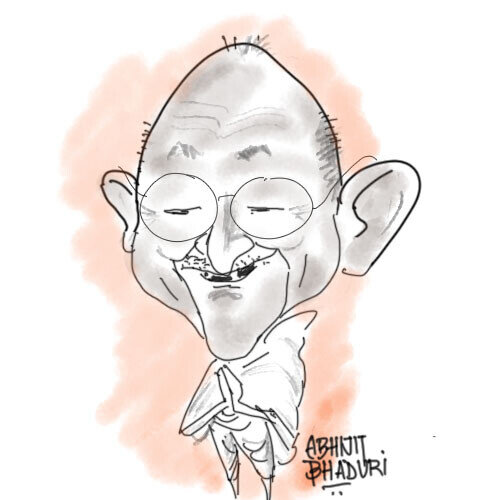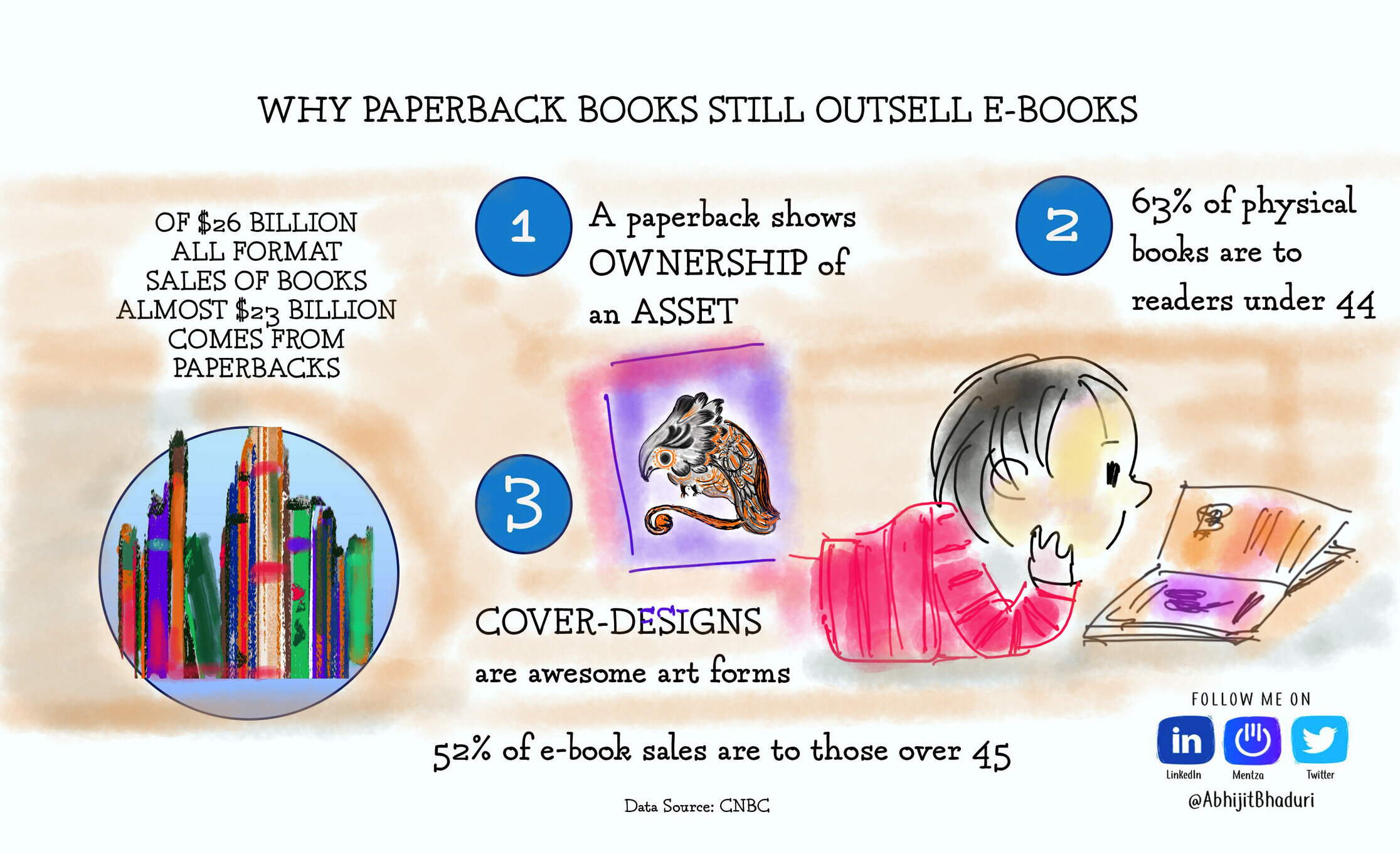The Complexity of Inclusion
We like to have choices because that creates an inclusive and hybrid world. Managing an inclusive world creates complexity that needs extraordinary leadership skills that very few possess.
Books or e-books
Do you read e-books or do you prefer to curl up in bed with the paperback? Do you like the gravitas of a hardbound book? I prefer to read non-fiction books on my Kindle app because I do not have a Kindle reader. I read the books on my laptop or phone because some documents are stored in doc/ docx or pdf format. Some send me e-Pub versions of their book for reviews. Every format that I accept in my library adds complexity..
Reading a paperback is a multi-sensorial activity. I have to feel the texture, smell the new book and hear the rustle of the pages when they flutter in the wind. I cannot choose between one or the other. I like paperbacks for their sensorial appeal. I like e-books for the convenience of storage and retrieval. When this choice extends to every field, it is exhausting.
Second order effects
When we cook for family members it is easy. We know their preferences and dislikes. If we invite a guest whose food preferences are different, there is complexity to be handled. We start with broad categories and funnel it down to specific nuances. We have to ask,"Do you eat meat or are you a vegetarian or vegan? Do you have any food allergies?" Each unexpected answer makes it more complex.
With each additional variables, ecosystem has to change. From utensils, ingredients, spices and sauces, every new cuisine or meal preference creates cascading effects. What we discuss with visitors can cause awkward moments. I have classmates who have left our WhatsApp group of friends because of a joke or insensitive comment. Platforms that were meant to offer free speech break up friendships built over decades.
Pluralist societies need unifying dreams
I remember some years back, my wife and I went house hunting. In that state, many apartment complexes would not rent their homes to non-vegetarians. Being discriminated against my meal preferences seemed unfair, but that brought home the complexity of being a pluralist society. Governance is easy if everyone has similar views and an iron hand is used to force people to ignore differences.
Fighting a common enemy can unite a nation. An inspiring cause can bring diverse people together. That is what successful leaders do. If there is no common cause or inspiring purpose, people start to create factions based on differences. That is where trouble foments. Each human being is different.
The O.C.E.A.N. of personality
Psychologists describe five personality traits - Openness to experience, Conscientiousness, Extraversion, Agreeableness and Neuroticism. The acronym OCEAN is an easy way to remember these traits. Each trait is a composite of many dimensions. Openness to experience explains imagination; insightfulness; varied interests; daringness; preference for variety; curiosity; complexity/depth etc. Read more
All traits are along a spectrum and varies according to the context. When forced by circumstances, most people will be open to eating what is available than starve. Someone may be open to trying out different cuisines may not be open to learning a new language when they move to a different city or country. Wearing the same coloured suit may be a productivity hack for a busy person. <Read more>
What does choice incentivise?
In 2008, in my second novel I wrote about the unintended consequences of incentives. To reduce the chances of dying from snakebite, the boss offers to reward anyone who brings in a dead snake. That incentivises people to breed snakes. When the rewards are withdrawn, the breeders release the snakes from captivity.
Anticipating second order effects is hard for most people. Some say the rise of autonomous vehicles will reduce road accidents that kill more than 150,000 people in India every year. Autonomous vehicles could prevent people from dying, but in turn lead to a shortage of organs made available from victims that are used for transplants. <Read more>
1. Wastage is inevitable
Every variant of a product creates more complexity in the factory because new raw materials are needed. It needs new marketing campaigns and takes up shelf space. If the consumer buys the new variant, other companies will follow. Until the consumer stops buying, variants will continue to be produced. If they stop buying, more choices will be created.
Innovation creates new choices. Each choice created leads to older variants ending up in landfill without even reaching the shelf. (Read about Ethical Fashion). Every new electronic product results in more landfill rather than donation to someone who would be delighted to get the product.
2. Complexity of managing choice
At the beginning of the year as the holiday calendar is drawn up, businesses wonder which religious holidays must be declared as paid time-off. Employers avoid controversy by declaring a certain number of paid time off that people can choose to take. Some of these may not coincide with a festival.
Should a movie be released on the OTT platforms like Netflix or Prime (or any of the other 40 OTT platforms) or should it be released in a multiplex for a complete movie-viewing experience? There are dozens of platforms to listen to podcasts. No one gets to hear all that is useful. We hear contradictory views on every matter. that leaves us unsure of what action to take. This decision fatigue gets compounded by fake news.
3. Decision fatigue and no accountability
I once worked in a company that had multiple unions. Some workers were part of the workers union but the majority of them were part of the clerks union. The clerks union had some workers, some clerks and some supervisors. Then there were supervisors who had varying political allegiances. Even simple decisions would take forever. No matter what was decided, the majority of the employees would be unhappy and refused to take accountability for the decision.
So is the talent pool. From full time employees and service providers, we have part-time employees, contractors and service providers who could be in your office or in their home or in some other country (like a digital nomad). Let us not forget that algorithms are a part of the contract. It is hard to make rules that fit every employment contract.
Should political and religion related conversations be banned at work? What about discussion on executive pay differentials? What about harassment? What about gender balance in the senior leadership positions? Read more
Inclusive cultures need extraordinary leaders
The complexity of individual choices will make us realise that maybe we will have to give up some individual choices. Sometimes just to make governance easier, we need to lessen the choices and options. We either have to be comfortable co-existing with plurality but that needs extraordinary skills in leadership (which most of us do not have). Else we live with fewer choices.
Diversity is necessary for innovation. Inclusion is necessary for social progress. They work when we have leaders who can unify diverse groups through an inspiring goal and vision. Such leaders are rare. In the absence of such leaders, we have no choice but to simplify and give up our choices.
In the interest of simplifying life, should we limit the number of choices in everything we offer? Love to know what you think? Leave a comment.
Here is a chat on how our notion of careers has changed. Does this describe what you are feeling? Email me abhijitbhaduri@live.com






